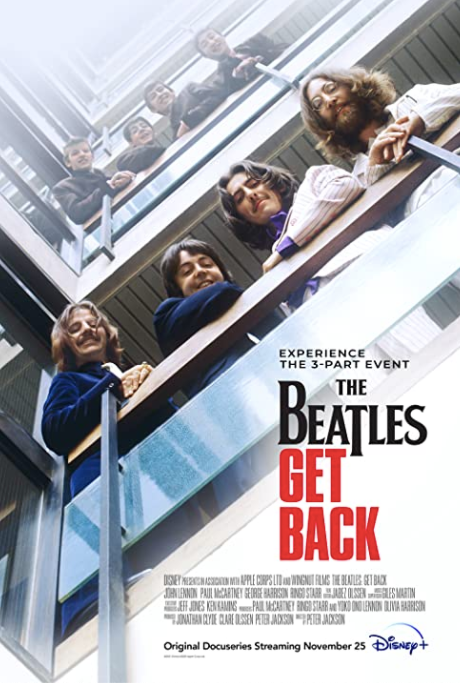
I started watching Get Back with the absolute knowledge that The Beatles were and are one of the best things in my life, and easily THE best thing musically. For the past few years, I've listened to them about as much as to MSNBC on Sirius XM radio, which is to say, any and all the time I'm in the car driving by myself (see The Omnipotent Ear). Their arrival in the United States in 1964 coincided with my first serious girlfriend, Barbara (we met when she came to hear my doo-wop group sing at a Y on the Grand Concourse in the Bronx). By January 1969, the time we see the Beatles in the studio in Peter Jackson's The Beatles: Get Back, I was with Tina, who became my wife. We're still happily married, with wonderful children and grandchildren.
So The Beatles in general, and Peter Jackson's documentary, are that central and important to my life. Masterpiece is not quite the right word for it, because experiencing the first part of this movie was more than that, deeply personal. But I will say that this documentary -- or, at this point, Part 1-- is brilliantly made. The rapid history of how The Beatles got to 1969, with words on the screen in an almost silent movie kind of style, worked perfectly. The two hours thirty something minutes flew by. Here are some moments that especially impressed, even touched my soul:
- George compliments Paul on his beard. This happens at the beginning of the movie -- that is, early on in the first seven days which are the timeline of Part 1. That's about the happiest interaction between Paul and George in this part of the movie, which is surprising, given that the movie has been billed as spotlighting the joy which was cut of out everything we saw and heard back in 1969 about The Beatles. But Paul is quietly relentless in his disparagement of George, ranging from his well-known plea to George to keep it "simple," to complaining that he can't hear himself sing with George playing, to just the expressions on Paul's face. None of George's songs at this point in the movie are taken very seriously, with the partial exception of "All Things Must Pass," which didn't make it into The Beatles' new album, anyway. In a word, though I'll always be a champion of Paul and his extraordinary talent, Jackson's movie makes me think that George had every right to be angry.
- John suggests changing "wind" to "mind" in George's "All Things Must Pass" ("a mind can blow the clouds away"). By 1969, Lennon's leadership of the band had clearly given way to Paul's. But his incisive, sparkling mind was as sharp as ever. It looks in the movie like he's looking at the lyric sheet, when he says something along the lines of "mind" being almost the same word as "wind". Marshall McLuhan would've loved the visual/acoustic written/verbal interplay.
- "Get Back" (the song) semi-seriously considered to be and developed into a protest song. There was a wave of fascistic anti-immigration fervor in England in 1968-1969 -- something we know all too well via Trump here in the United States in the past few years -- and Paul and John toy with pitching the song as a satire critique of what the right wing was calling on the Pakistanis who came to England to do.
- Ringo, watching and hearing Paul play the piano, says he could listen to that all day. One of sweetest, most heartwarming moments of the movie.
- Yoko and Linda talking and laughing. Shatters some of myths of Yoko and The Beatles, and also heartwarming.
- The joy on Mal Evan's face every time he plays the hammer in "Maxwell's Silver Hammer" -- he's just thrilled to actually play even this smart part in a Beatles' performance. I can understand how he feels, completely.
- The sheer abundance of Paul's contribution is just incandescent magnificent: In addition to "Silver Hammer" and "Get Back," we get clips of "Let It Be," "Long and Winding Road," "Two of Us," even "Another Day" (which, like George's "All Things Must Pass," never made it to The Beatles album we see under preparation).
Back to George: As I said, I don't blame him for being hurt and angry. I can't quite say the same about his leaving The Beatles, which closes out Part 1 of this life-changing documentary. But, all right -- I'm going to post this, then do a podcast about it, then watch Part 2 of this movie, and I'll be back again.
And here's the podcast:
And here's "It's Real Life" -- free alternate history short story about The Beatles, made into a radio play and audiobook and winner of The Mary Shelley Award 2023 ... and expanded into a novel
See also The Beatles: Get Back, Part 2: Back from the Threshold and The Beatles: Get Back, Part 3: Up On the Roof and my review of Rob Sheffield's Dreaming the Beatles and A Vote for McCartney (my very first published article, in The Village Voice, 1971)
here is one of the songs I sang with my doo-wop group, The Transits, in early 1964

2 comments:
I also feel a special resonance with the time and place. This was our young adulthood wrapped up in four poet/musicians from Liverpool. At one point Paul actually says about the friction with Yoko “In 50 years this will seem silly” and chills went down my spine. That being said, Part 1 was a lot of musical sausage-making—not for everyone, but perhaps essential for those of us who lived through that time.
Well said, Bob!
Post a Comment